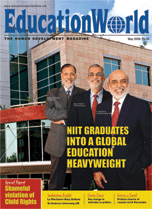Welcome initiative
 Congratulations to NIIT for promoting the NIIT University in Rajasthan (cover story EW May). Given the excellent reputation this computer skills training company has built over the past two decades, I’m sure they will do a good job. The university can incorporate some of the best corporate and management practices NIIT has pioneered and implemented over the past 30 years.
Congratulations to NIIT for promoting the NIIT University in Rajasthan (cover story EW May). Given the excellent reputation this computer skills training company has built over the past two decades, I’m sure they will do a good job. The university can incorporate some of the best corporate and management practices NIIT has pioneered and implemented over the past 30 years.
I strongly believe that more companies such as NIIT should come forward to promote universities in India. Except for a handful, most higher education institutions offer sub-standard education producing unemployable students who require massive inputs of in-house training. The tertiary education system requires focused and committed corporates such as NIIT to energise and modernise higher education institutions. I wish NIIT University all the best.
Suman Ranganathan
Chennai
Utterly disappointing
I was saddened but unsurprised to read the special report on India’s gross child rights violations (EW May). It is utterly disappointing that, despite a 40-year-old government promise to improve spending on education and healthcare, millions still lack access to basic education, clean water and proper nutrition.
I’m visiting India from North America. I see many aspects of our educational system that could be applied with great success to India. First and foremost is government commitment to education funding. North American government spending on education and healthcare dwarfs India’s. Clean, well-maintained public schools are the norm and teachers are well-educated, work regular hours and teach classes of 30 students or less. Financial assistance is available for kids who can’t afford textbooks or school fees. Literacy and lunch programmes are alive and well in the majority of our schools.
A well-educated young population guarantees India’s future more than any company or industry. Studies like the one completed by the PROBE team (EW May p.40) have shown that it’s not as simple as getting children to come to school — teachers must be engaged and active in ensuring their students acquire an insatiable appetite for learning and achievement. Efforts must be made to keep children in school and out of workplaces.
It’s inexplicable why politicians continue to drag their feet on this issue. I believe that the only way out of this is for the government to make good on its promise to enact the long-awaited Right to Education Bill and crack down on child labour with serious penalties for violators. Unless governments, NGOs and parents work together in a concentrated effort to help build a bright future for the next generation, I fear the lamentable statistics of Indian education will remain unchanged for years.
John Brausse on e-mail
Fearless response needed
I refer to the Education News item ‘Another ragging casualty’ (EW April). Recently some extreme cases of ragging have been reported in the media. Despite a law banning ragging in colleges and universities, the practice still continues, often with fatal consequences. Students found guilty of ragging should be severely punished.
In order to root out this sinister practice from our campuses, I suggest colleges and universities open a week before the academic session starts, to enable new entrants to spend quality time getting to know each other and their seniors. Also freshers must be counseled to be brave and alert, and to report to authorities — college/university/police — ragging incidents without fear. Jo dar gaya so mar gaya (One who fears, dies).
Mahesh Kapasi on e-mail
Positive change at last
As commented by the authors of the PROBE Report in your last issue (EW May), there are signs of positive change in our primary education system. After a very long time, I came across positive and interesting news indicating that India is on a progressive path. If every Indian child has access to education, and as enrolment gap between boys and girls virtually disappears in primary education, I’m sure we can transform India into a developed nation. It’s encouraging to learn that the mid-day meal scheme has finally reached true beneficiaries, except in Bihar.
Despite some loopholes like the poor quality of education and teacher shortages, something has moved forward, which is a good sign. If the movement for universalisation of elementary education acquires momen-tum, a time will come when the world will view India from a different perspective. Nothing is impossible if only we believe that we can, and we shall, do it.
Sharmila Ganesha
Bangalore
Great fear
Re your special report ‘Politicians in education: cost-benefits’ (EW March), politicians in India are synonymous with corruption and bribery. Though there is a tiny minority of principled politicians doing their bit to change the system, most politicians are corrupt and unprincipled to the core. For most of them, promoting an education institution offers a money laundering option. They are seldom concerned with providing quality education or instilling good values in children and youth.
True, by using their status, connections and money power, politicians can contribute to the spread of education. But I fear that behind the doors of their education institutes, more harm is being done than good. My great fear is that students from amoral education institutions promoted by politicians will graduate as self-serving and corrupt individuals.
Sanjana Mathur
Ahmedabad